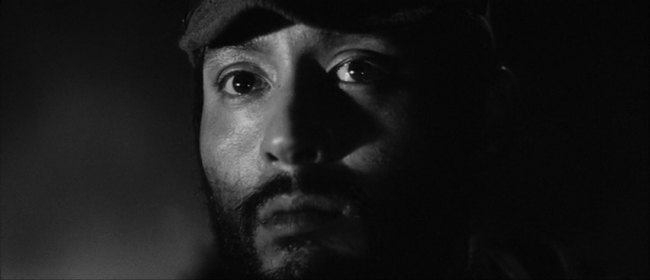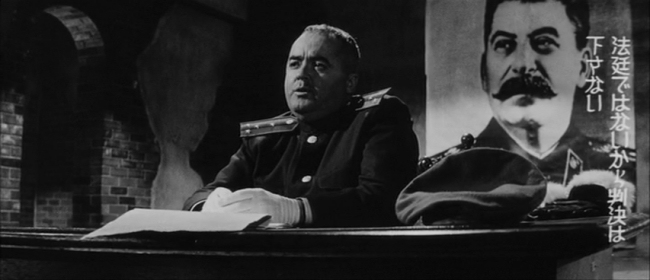
In the third and final portion of The Human Condition (人間の條件), released in 1961, two years after the first two, Kaji finds himself wandering China in the immediate aftermath of World War II. In many ways the best film of the series, it still has a very simple message but manages to evoke a real sense of the injustice of persistent human suffering.

Accompanied by a handful of men left over from his unit, we join Kaji (Tatsuya Nakadai) trudging through Chinese wilderness and it becomes increasingly clear the remaining Japanese military is in tatters, few even sure what the state of the war is. After Kaji and his men join up with a group of Japanese civilian refugees in the woods, Kaji finds himself finally forced, in desperation, to assert command. The fact that he's become a Communist who insists on taking charge is an irony not lost on him or the people he leads, some of whom mock him relentlessly for it.

But they're starving and Kaji's bag of rice is the last bit food so he has little choice but to exercise control of the group's resources. Otherwise, any one of the refugees would take it all for him or herself. Furthermore, Kaji has to deal with other roaming Japanese units, may of whom are hostile or wish to assert command over him.

This third film focuses a lot more on women and sex. The first two films both argued for the necessity of sex--the prostitutes brought to the prison camp in the first film, the hidden pin-up and the conjugal visit in the second film--this film goes further in that argument when Kaji's group comes upon a Japanese refugee camp where they find Chishu Ryu and Hideko Takamine in prominent guest roles.

Takamine tells Kaji how the women in the camp have sex with any soldiers who happen by. She gives a wistful soliloquy about how during those nights of physical intimacy they can trick themselves into thinking the war isn't real and that there's hope. But then the soldiers are always gone by the next day.

The subject of rape is introduced in this film and two women join with Kaji's band, both there essentially to explore the issue. The first (Kyoko Kishida) is menaced by one of the villainous Japanese soldiers in Kaji's group--again, all the characters are evenly polarised into good people and bad people--and Kaji intervenes to save her. But I was reminded of Hooded Justice in Watchmen when Kaji also chastised the woman for teasing the man. She hadn't really seemed to be doing so--she'd only told him that she was going to undress in order to bathe--but her reply to Kaji is a perplexing admission that she finds the man attractive. What the film is trying to say at this point isn't clear and suggests uncertainty in the filmmakers' own perspective on sexual assault.

Still, it's hard to see how they thought it made sense for Kaji to let an 18 year old girl (Tamao Nakamura) leave accompanied by only three men Kaji had already singled out as would-be rapists. Mostly rape is in the film as another aspect of human nature Kaji is forced to ponder how, or if, he should regulate. Ironically he and another Communist in the group, Tange (Taketoshi Naito), have faith that the Russian Red Army will be better than the Japanese and they're horrified to come across a large group of Japanese refugee women who talk about some geishas among them who sacrificed themselves in order to prevent assault on all of them by Russian troops--and how the sacrifice had been in vain.

But at the camp where they meet Chishu Ryu and Hideko Takamine they learn that normally the Russian troops they encounter are generally civil while the Japanese troops tend to be cruel and obnoxious. In the last portion of the film, Kaji becomes a prisoner of the Russians, now finding himself at last on the other side of the kind of barbed wire fence we saw in the first film. And he discovers in fact the Russians are better administrators than the Japanese officials Kaji worked with. The Russian officers insist the Japanese prisoners not be physically abused and are provided with medical treatment when necessary. Unfortunately, a hierarchy is enforced within the prisoner community so Kaji finds himself once again at the mercy of villainous Japanese officers.

In a particularly effective, insightfully cruel scene, Kaji tries to communicate his shared philosophy with the Russian officers but he's forced to go through a villainous Japanese interpretor who twists all his words. This moment is one of the more successful in the film because it really does get at something at the heart of "the human condition", miscommunication leading to conflict. Though ultimately the problems in the Russian camp seem essentially to be there to simplistically argue that the problem with the Russian army is that they're not Communist enough.

The end of the film is effectively grim but of a piece in a series that has essentially been about Kaji enduring various forms of abuse and physical suffering in the name of humanism. Finally he becomes a martyr in a world dominated by the selfish and the greedy. Which is an effective ending for a simple morality tale but one of the reasons I found this film less effective than the post-war films of Kurosawa or Naruse is that it seems to be arguing that the good Japanese people are people like Kaji who long before the war already knew the cause was bad, and the bad people are the ones who believed in the Emperor and everything Japan stood for in going to war. I doubt many in the audience at the time of the film's release could truthfully claim to be a Kaji so the film is more escapist than it is an honest piece of soul searching. But Nakadai's performance is admirable, it's well shot, and has many really nice moments.

No comments:
Post a Comment